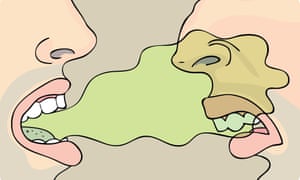Bad Breath : how to Avoid it
 Don’t fool
yourself,” said a 1928 advert
for Listerine mouthwash, “Since halitosis never announces itself to
the victim, you simply cannot know when you have it.” Many of us do indeed
worry that our breath smells fetid and sulphurous. There’s even halitophobia,
when people are convinced they have bad breath but don’t. It is
estimated that up to half of us have bad breath, which seems a bit
excessive: the rate of “objectionable bad breath” is thought to be
more like 2.4% of adults.
Don’t fool
yourself,” said a 1928 advert
for Listerine mouthwash, “Since halitosis never announces itself to
the victim, you simply cannot know when you have it.” Many of us do indeed
worry that our breath smells fetid and sulphurous. There’s even halitophobia,
when people are convinced they have bad breath but don’t. It is
estimated that up to half of us have bad breath, which seems a bit
excessive: the rate of “objectionable bad breath” is thought to be
more like 2.4% of adults.
It’s hard to diagnose it yourself. Breathing into
your hands and sniffing them only tells you if your hands smell. Licking the
back of your wrist and smelling it after 10 seconds isn’t accurate either.
Flossing and then smelling is only likely to reflect any decaying food. The
taste in your mouth isn’t closely related to how your breath smells. Breath
clinics have machines such as halimeters that measure sulphur emissions, but
the most reliable way is for an expert to smell and score the level and type of
odour. Or failing that, a close friend.
In 85% of people, halitosis
originates in the mouth. You may think that’s obvious, but
tonsillitis, acid reflux in the oesphagus and kidney and liver problems can
also make the breath smell. However, it’s
the 600-plus bacteria in the mouth – particularly the ones producing
unstable sulphur compounds from proteins breaking down – that are usually the
culprits.
A BMJ review
says that it is poor oral hygiene that’s usually to blame. The most likely
cause is food and bacterial plaque on the tongue and teeth – especially when
this causes gum inflammation. The main culprit is the back of the tongue, and
some people happen to have grooves that allow a white coating to accumulate. A
coating that is only 0.1mm thick can reduce the oxygen to the tongue, allowing
the bacteria that grow best without oxygen to flourish and produce smelly
compounds.
The solution
Regular teeth-brushing and flossing will reduce
the problem. A systematic
review found that tongue scraping (which I always thought was a
stupid idea) might work – but do it gently, back to front, as there are more
bacteria at the back. Another
review found that mouthwashes with chlorhexidine gluconate, which
reduce bacterial levels, can help, especially after tongue-brushing when the
bacteria are exposed and defenceless (although too much mouthwash can stain the
teeth). Using before bedtime may also work well, as bacteria multiply at night
when the mouth is dry and gets less oxygen. Ones without alcohol are best as they
avoid drying out the mouth.
But all these things need to be used continually.
Chewing
sugar-free gum stimulates saliva and reduces bad breath and is a
good insurance policy during the day.
Source :
the Guardian, emedicine


Commentaires